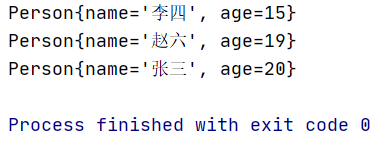Lambda表达式-练习前篇
使用Lambda标准格式(无参无返回值)
题目:给定一个厨子Cook接口 内含唯一的抽象方法makFoodd 且无参数 无放回在 使用Lambda的标准格式盗用invokeCooK方法 打印输出“吃饭啦!”字样:
代码
接口
public interface Cook {
public abstract void makeFood();
}
测试类:
public class test {
public static void main(String[] args) {
method(()->{ System.out.println("吃饭啦!"); });
}
public static void method(Cook cook){
cook.makeFood();
}
}
Lambda的参数和返回值
需求:使用数组存储多个Person对象 对数组中的Person对象使用Arrays的sort方法通过年龄进行升序排序
代码
封装类
public class Person {
private String name;
private int age;
public Person(String name, int age) {
this.name = name;
this.age = age;
}
public Person() {
}
public String getName() {
return name;
}
public void setName(String name) {
this.name = name;
}
public int getAge() {
return age;
}
public void setAge(int age) {
this.age = age;
}
@Override
public String toString() {
return "Person{" +
"name='" + name + '\'' +
", age=" + age +
'}';
}
}
测试类:
public static void main(String[] args) {
//使用数组存储对象
Person[] arr={
new Person("张三",20),
new Person("李四",15),
new Person("赵六",19)
};
//对数组中的person的年龄进行升序排序
/* Arrays.sort(arr, new Comparator<Person>() {
@Override
public int compare(Person o1, Person o2) {
return o1.getAge()-o2.getAge();
}
});*/
//使用Lambda的表达式进行排序
Arrays.sort(arr,(Person o1,Person o2)->{return o1.getAge()-o2.getAge();});
//遍历数组
for (Person person : arr) {
System.out.println(person);
}
}
运行结果:




【推荐】国内首个AI IDE,深度理解中文开发场景,立即下载体验Trae
【推荐】编程新体验,更懂你的AI,立即体验豆包MarsCode编程助手
【推荐】抖音旗下AI助手豆包,你的智能百科全书,全免费不限次数
【推荐】轻量又高性能的 SSH 工具 IShell:AI 加持,快人一步
· 地球OL攻略 —— 某应届生求职总结
· 周边上新:园子的第一款马克杯温暖上架
· Open-Sora 2.0 重磅开源!
· 提示词工程——AI应用必不可少的技术
· .NET周刊【3月第1期 2025-03-02】